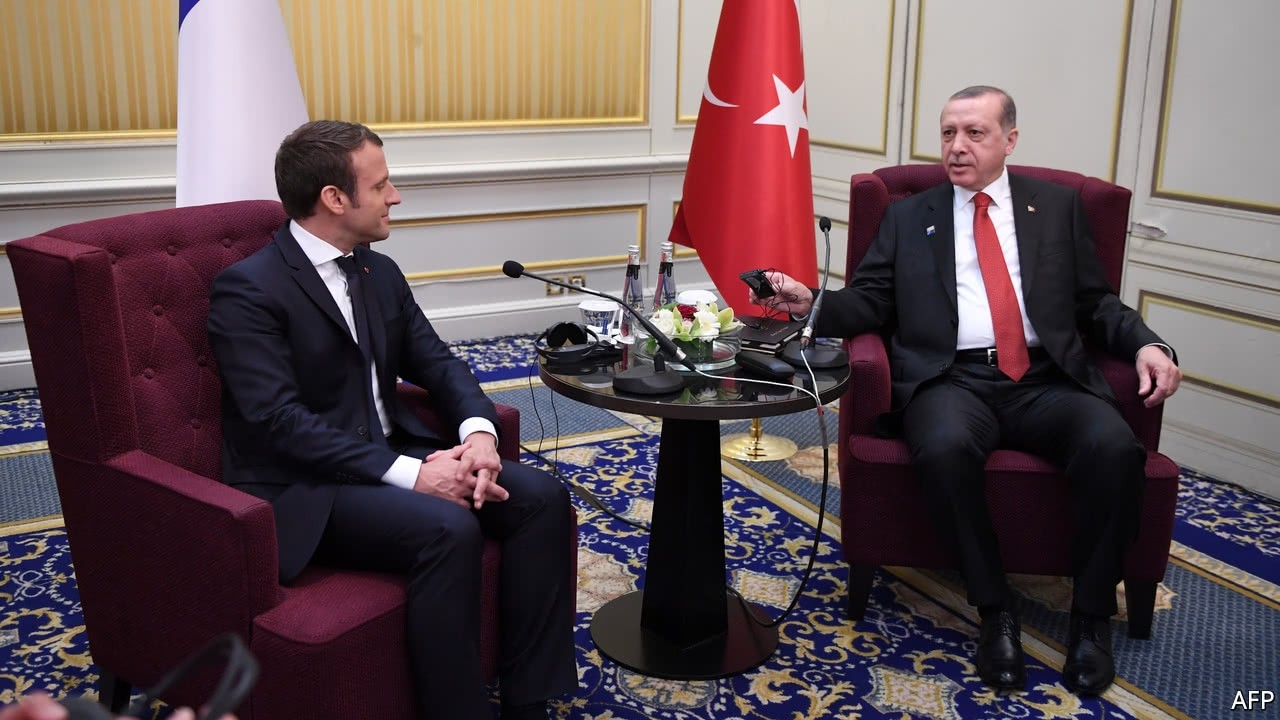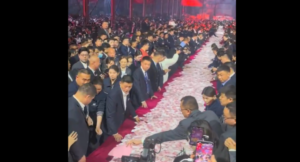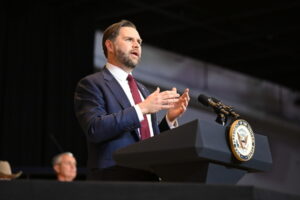Turkey’s President, Recep Tayyip Erdogan, spent the early part of this year repeatedly insulting his NATO allies, partly with the aim of stimulating nationalist sentiment at home in order to win a constitutional referendum giving him nearly autocratic powers. He won that referendum in April, and has since been trying to repair his damaged ties with the West. But as the NATO summit in Brussels on May 25th showed, the charm offensive is not going very well.
At the summit, Emmanuel Macron, France’s newly elected president, pressed Mr Erdogan to release a French photographer held for more than two weeks in a Turkish deportation centre. Germany’s Angela Merkel, whose government Mr Erdogan accused of Nazi practices in the run-up to the referendum, complained to him about the arrest of a German reporter three months ago. Mrs Merkel also insisted that Turkey allow German MPs to visit Incirlik airbase, where 250 of her country’s troops are stationed. (Turkey has refused to do so since the Bundestag passed a resolution recognising the Ottoman massacres of Armenians during the first world war as genocide.) Mrs Merkel threatened to withdraw the German forces if the block is not lifted.
Turkish hopes for chummy relations with America’s new administration have been disappointed, too. Donald Trump, who seems to get along well with autocratic rulers, was the only Western leader to congratulate Mr Erdogan on his referendum victory, and the Turkish president planned to bond further during a trip to Washington, DC on May 16th. Instead the visit produced a public-relations disaster: Turkish guards were caught on camera beating Kurdish and Armenian demonstrators in front of their embassy, as a stony-faced Mr Erdogan looked on. America’s State Department summoned the Turkish ambassador, and a group of congressmen demanded that those responsible for the thuggery be prosecuted. Brazenly, the Turkish embassy blamed Washington’s police force for failing to take “appropriate measures” against the protesters, who it claimed had “aggressively provoked” the Turks. Even more absurdly, the foreign-affairs ministry in Ankara summoned America’s ambassador on May 22nd to treat him to a tongue-lashing and a lecture on crowd control.
Mr Erdogan had wanted to convince Mr Trump to stop outsourcing the ground war against Islamic State (IS) in Syria to a Kurdish militia which Ankara considers a terrorist group. Less than a week before his arrival, Mr Trump torpedoed that idea by approving a plan to arm the militia, known as the YPG, with machine guns and armoured vehicles. In the end, Mr Erdogan came away with assurances that America would continue to back Turkey’s offensives against the same Kurdish insurgents elsewhere, in Turkey and northern Iraq.
But a fresh confrontation over the YPG may be looming. Turkey has already bombed the group’s positions in Syria. If attacked by the insurgents, “we will exercise our rights under the rules of engagement without asking anyone,” said Mr Erdogan after his meeting with Mr Trump. For the Americans, the priority is to help the YPG and other forces to conquer Raqqa, ISIS’s self-proclaimed capital and the biggest Syrian city still under its control. “America wants Turkey to take the pressure off the YPG during the campaign against Raqqa,” says Saban Kardas, an analyst in Ankara. “We will not play that game.”
Military experts say that Turkey may take advantage of the Raqqa offensive, which has drawn away many of the YPG’s forces, to stage an incursion against the group’s strongholds in Syria’s north. Such a move would lead to another diplomatic crisis between Turkey and America, if not a direct military confrontation.
Mr Erdogan has another bone to pick with America. For months, he has called on Mr Trump to deport Fethullah Gulen, a Pennsylvania-based cleric suspected of masterminding the attempted coup against Turkey’s government last July. The Turks once hoped that Mr Trump would be more obliging on this count than Barack Obama had been. Indeed, Mr Trump’s former national security adviser, Mike Flynn, and his lobbying firm were being paid during the presidential campaign to press for the interests of the Turkish government. According to a former director of the CIA, James Woolsey, members of Mr Flynn’s firm spoke to Turkish officials at the time about kidnapping Mr Gulen and packing him off to Ankara. Mr Flynn strongly denies having done so. But he is now out of the White House, and none of Mr Trump’s new advisers seem as understanding of Turkey’s concerns. In America, as in Europe, Turkey is starting to run out of friends.
Ask me anything
Explore related questions





